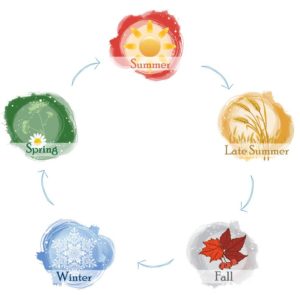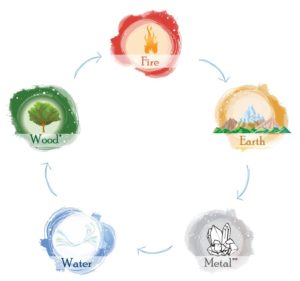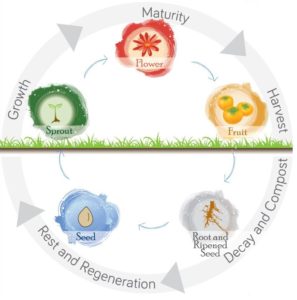
Happy Solstice! In the midst of holiday hustling and bustling, I invite you to pause to acknowledge and honor today’s official beginning of winter. Winter Solstice (December 21) marks the longest night of the year in the Northern Hemisphere. It’s easy to forget during this busy holiday season – which gets longer and longer each year – that the rest of nature is, well, resting. Sleeping. Hibernating. Dreaming. Conserving energy. Why aren’t we?
This post is the third in a series about the Five Phases recognized in Traditional Chinese Medicine (TCM). TCM uses Five Phases, also known as Wu Xing or the Cosmic Dance of the Seasons, as a way of explaining both the inner and outer worlds that we inhabit. The Five Phases were developed after many years of observation and cultivating health by adhering to the cycles of nature.


Each season, or phase, corresponds to a specific element and personality archetype.
- Element. Winter relates to Water. As an element, Water conceives, concentrates and conserves.1 It symbolizes both life and death. It is the primordial soup from which all life emerges, the wellspring of creativity, and the depths to which we return. Winter is a time to rest, renew, and regenerate.
- Personality archetype. Water types are the Philosophers, or those who are introspective, self-sufficient, scrutinizing, and actively seek knowledge and understanding. (Here is a link to a quiz to find out “your” phase.)
The themes associated with Winter or Water are reflection and rejuvenation. It’s where you conserve your energy as well as recharge your batteries. In Nature, the seed is ensconced in the earth, full of potential, gathering strength to burst forth in the spring.

Gail Reichstein, author of Wood Becomes Water, writes:
“A well-balanced Water element allows us to move through the world with confidence and calm. It gives us a sense of strength and an awareness of our ability to handle even difficult situations. Water also provides for endless creativity and a love of relaxation and quietude. Healthy Water gives us a balanced perspective on our own struggles, and the ability to view the struggles of others with compassion.
Because of its deep interiority, the Water within us is easily drowned out by our busy lives and manifold obligations. When this happens, we lose touch with inner peace, wisdom, and our sense of knowing. We may feel exhausted, depressed, out of sync, or just plain irritable. This is a time to dive into our private oceans, to reacquaint ourselves with who we are and what we need. Only after we have taken this valuable time for ourselves can we begin to interact properly with the outside world.”
The gifts of Winter or Water include:
- Pure potential (your dreaming and reflecting time).
- Non-action (or being still, as evidenced by animals hibernating and dormant plants – not our own scurrying about).
- Deep listening (to our inner voices and inner needs).
- Perseverance and endurance (keep on keepin’ on through the cold, dark, and bleak).
- Survival (see above).
- Courage in the face of the unknown (just being with yourself without the constant distractions of rushing and doing can be hard).
How do you know if you are experiencing a full (balanced) expression of the Winter/Water phase? You can:
- Use your energy wisely to follow your passion and manifest your purpose.
- Balance courage and healthy fear.
- Find enough stillness to allow time for reflection and rejuvenation/regeneration.
How can you tell if you are under expressing Winter (Water deficient)? You may:
- Find it difficult to be still.
- Find it difficult to not know.
- Feel fearful.
- Be stressed out.
- Feel exhausted, but can’t sleep.
- Be constantly going and doing.
Hint: Most of us tend to be Water-deficient, especially in North American cultures.
How can you tell if you are over expressing Winter (Water excess)? You:
- May also feel exhausted and fearful.
- Are often depressed.
- Have suppressed immunity.
- Can’t keep going.
- Feel stuck.
Helpful practices to balance Water include:
- Create space where it feels safe to slow down.
- REST, meaning deep sleep and naps. Sitting on the couch watching Netflix doesn’t count!
- Learn to prioritize and say “no” to activities that just deplete you.
- Take time to really listen to yourself and others.
- Find courage. Take heart that you know enough and are enough to take the next step.
- Find a way to connect with yourself on a deeper level. Try journaling your dreams or creating art.
- Luxuriate in long baths or hydrotherapy (soak your feet or hands). Have you tried a float tank yet?
- Allow time for daydreaming and self-reflection.
- Move your body gently. Try light yoga, tai chi, stretching, or walking.
- Work with your ancestors/lineage. We all hold the strengths of our ancestors as well as our personal power.
Herbs are also an effective remedy for bringing someone back into balance. The specific herbs to take to balance Water depend on whether you are exhibiting excess or deficient conditions, and on your constitution. In general, herbs that are adaptogens – or those that are deeply nourishing and help your body adapt to stress – are going to be the most helpful.
For example, for someone who is under-expressed and frenetic, ashwagandha root (powder form) is a powerful ally. Ashwagandha aids in restoring sleep and addressing other issues that come with being overactive such as anxiety, infertility, immunodeficiency and a sense of exhaustion. For someone who is over-expressed and kind of wallowing in the fearful depths, a stimulating adaptogen like Eleuthero/Siberian ginseng, schisandra, or rhodiola fits the bill. (Note: I’m sure these herbs sound exotic, but you’ll start to notice them in herbal formulas or even sold in bulk at natural food stores.)
To keep yourself balanced within Water, salty (meaning “mineral-rich” in herbal-speak) herbs like seaweed, nettle, and alfalfa are the go-to herbs for this season. Bunce likes the healing properties of burdock root in particular since it can be prepared as food and it helps to manage water and minerals in the soil as well as in our bodies.
In addition to herbs and the practices above, studies have shown that energy work is effective in calming fear and promoting deep relaxation.
To really thrive in Winter, look for ways you can bring a settling, grounding, and open energy to your days. Do you have enough silence to listen to yourself? Do you have capacity to live with uncertainty? Do you have the ability to sit, be still, and feel content – to be receptive to what comes your way?
Sources:
- Beinfield, Harriet and Korngold, Efrem. Between Heaven and Earth: A Guide to Chinese Medicine, New York: Ballantine Books, 1991. Print.
- Reichstein, Gail. Wood Becomes Water: Chinese Medicine in Everyday Life, New York: Kodansha USA, Inc, 1998. Print.
- Larken Bunce. Five Phases: The Nature of Your Health. Nov. 2015. Webinar.
